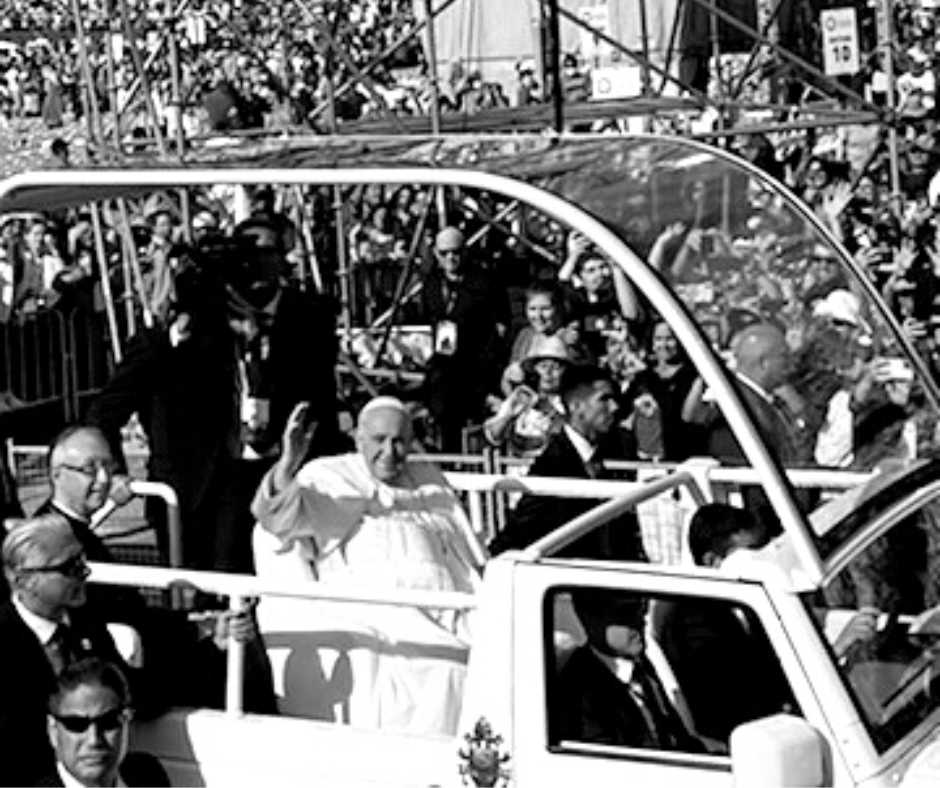In October of 2021, Pope Francis announced to the world, that the Church would undertake the enormous task of consulting with the laity of every diocese and archdiocese in the world. Thus the Synod on Synodality began its journey.
The Holy Father asked:
- How is this “journeying together” happening today in your local Church?
- What steps does the Spirit invite us to take in order to grow in our “journeying together”?
These two questions strike at the core of our Catholic identity. We are being asked to examine our self in relation to the church and how we can grow the mission of Christ – individually and in communion with one another.
The reason Catholic schools exist is to bring Christ to our students through the message of the Gospel. Through the teachings of the Church, witness of the faith community, and support of the Catholic school, the triad of HOME, SCHOOL, and PARISH is well established.
We know this. However, the challenge we face is real – how are we doing this in relationship with one another and in full communion with the Catholic Church? At every turn we watch a secular culture preaching individualism to our children. We hide under the bushel basket, afraid of being attacked by what is less than a tolerant society. Yet, without the preaching of the Gospel (in all places, on all occasions, without hesitation, reluctance or fear), we fail.
During the Synod Listening Session we shared our vulnerabilities as teachers, students, parents, administrators, politicians, and community members. When we began to really listen to one another with the intent to understand (versus our predisposition to merely 'respond'), we embarked on a journey of discovery. We felt the passion, joy, and at times despair of Catholic education. Many express that Catholic schools play a tug of war with our secular society; that when these tensions emerge they play havoc with our Catholic identity and we lose sight of who we are. This sampling of comments from the Synod Listening Sessions provide a lens through which we may begin to discern. I share their unedited voice, to respect both their message and their emotion:
- Other teachers and staff at the Catholic School where I work and in other Catholic schools. We are called to be authentic with one another, sharing more deeply our joys, sufferings, passions and doubts
- My biggest challenge is feeling safe to talk about my faith in the school staff room as many in it, although Catholic, vocally admit to not being interested. These are the people who are supposed to be teaching the faith in Catholic schools.
- When I hear the word church I think of a community of people being brought together by faith. I think of new begins and change. When you go to church you are impacted by the lessons and story's they tell whether they are good or bad.
- For a lot of students we do a lot of social justice work, I didn’t make an automatic connection between our acts of service and the work of the Church. I understood the act of kindness as something random, rather than an active expression of my faith
- In a school, the principal plays a key role in influencing the climate within that school and it’s Catholicity; likewise, the parish priest must have a passion for his work and a genuine love for young people.
Similarly, in the AWCB and CCCB Synod synthesis report, the following comments were expressed:
- Improve the faith formation in Catholic schools, strengthen the connection between schools and parishes, and support school teachers in living their faith
- There is a need to develop ongoing catechesis and education and to find new ways to engage families. It was also pointed out that parishes and, where they exist, Catholic schools, need to be more active in sacramental preparation so as to inspire Catholics
- Concern with regards to the ongoing challenge of secularization in Catholic schools
We now eagerly await to learn about the themes generated during the Continental Listening Sessions. It is from here that the Instrumentum Laboris will be written in preparation for the XVI General Ordinary Assembly of the Synod of Bishops in Rome.
It cannot be overstated that our Catholic schools need to be steeped in authentic teaching of the faith with well-formed teachers, administrators, and leaders. School, family, and Church must continue to forge paths that allow everyone to journey together, always in alignment with the teaching of our faith.
May our Synodal journey continue to inspire us to speak and listen with kindness and compassion for the purpose of cultivating a Catholic culture and identity in our Catholic schools. Our students deserve nothing less.
Dr. Eugenia Pagnotta-Kowalczyk is a former teacher and principal in the Edmonton Catholic School Division, as well as Executive Director and Director of Advocacy of the Alberta Catholic School Trustees' Association. She has also worked as a sessional instructor at St. Joseph College at the University of Alberta. She holds a PhD in education leadership and Catholic identity from the University of Portland and an M.Ed. in curriculum and leadership from the University of Alberta. She is currently employed at the Archdiocese of Edmonton as Mission Engagement Lead and Synod Coordinator.




